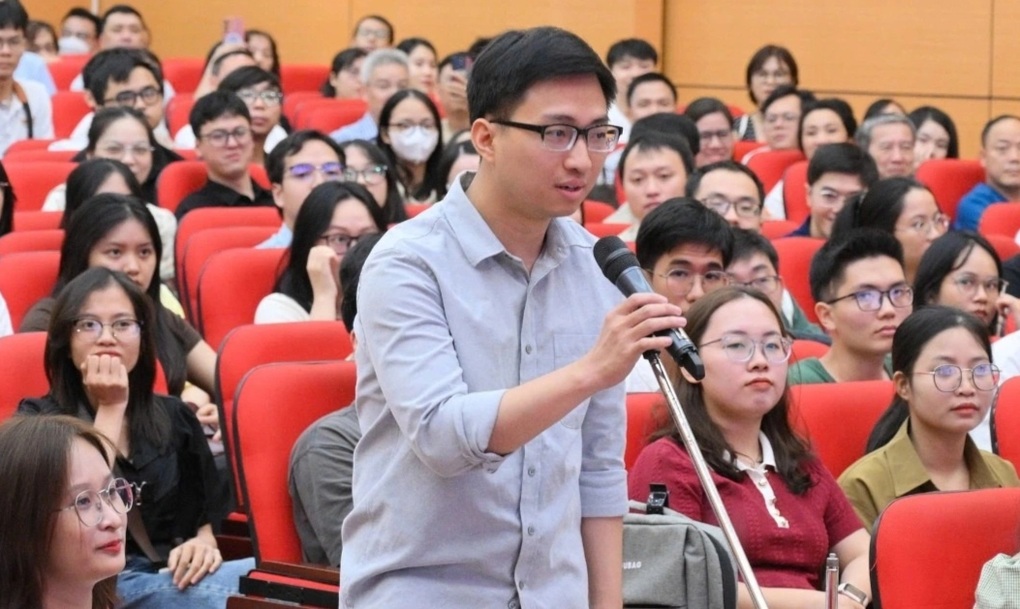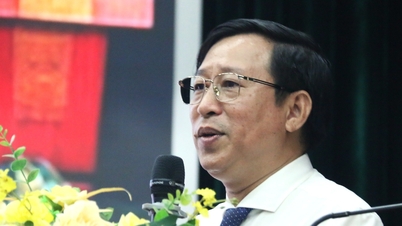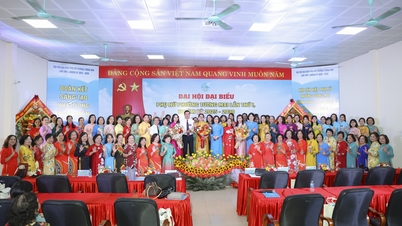The call-out of names for resident doctors of Hanoi Medical University to choose their majors has been causing a stir on social networks in recent days.
According to assessment, this is one of the most difficult and rigorous training levels in the medical industry. Candidates must pass an entrance exam with a wide range of knowledge, and at the same time undergo continuous study and practice at the hospital.
"No time to spend money during residency"
That is the comment of Dr. Hong Chien (working at Hoe Nhai General Hospital), who did his residency 10 years ago.
Doctor Chien said that year his class had about 70-80 residents, the quota was not as large as it is now, so the exam was quite stressful because there was no multiple choice test.

The valedictorian of the 2025 Hanoi Medical University residency exam is choosing a major (Photo: My Ha).
"A day as a resident doctor is like a whirlwind. At around 6am, we arrived at the hospital.
The resident doctor will go to the patient's room with the attending physician to check on the patient's condition and prescribe medication; the surgeon can perform surgery, then return to examine the patient, and if there is an emergency, continue the surgery...", Dr. Chien recalled.
According to Mr. Chien, at that time, resident doctors who went to school would have a salary, and those who participated in surgery would have expenses. "I remember when I finished my residency, I received about 80 million VND in salary because I was busy all day, running from one hospital to another, and had no time to spend money.
I have a girlfriend but rarely have time to take her out, sometimes we go on dates. To me, those simple meetings are as precious as going on a trip ," Dr. Chien confided.
For Dr. Chien, residency training brings many obvious benefits. First of all, this is an intensive training environment, helping young doctors to practice systematic clinical skills right in the hospital.
Second, residency provides the opportunity to directly access many complex cases, thereby accumulating practical experience that books can hardly provide.
Resident doctors are often directly supervised by teachers and leading experts, creating conditions to improve professional capacity.
Upon completion, a residency degree is also a great advantage in your career path, opening up opportunities for further study, research or advancement in the industry.
However, Dr. Chien believes that not every resident doctor is good and not every good doctor goes to residency.
Resident doctors typically have a large workload and often work at night, so they have little time to read and research to strengthen their expertise and update new knowledge.
Meanwhile, a good doctor cannot rely only on practical experience, but needs to continuously study, supplement theoretical foundations and modern medical advances.
The hottest battle of wits in the medical industry
It is known that residency is a special training program, selecting the best students in the medical field. This model originated in France, then spread to European countries, the US and around the world . Vietnam currently has 13 schools training residency doctors.
Resident doctors are strictly selected through an entrance exam with the requirement that candidates must be under 27 years old, have never been disciplined and can only take the exam once in their life. The exam consists of 4 subjects: two specialized subjects, one basic subject and one foreign language (English, French or Chinese), each subject lasts 90 minutes.
In 2025, the residency training program will enroll 426 students, of which 402 will be for Hanoi Medical University; 13 for Thanh Hoa Branch; 6 for Lao Cai Department of Health; and 5 for Thai Nguyen Central Hospital.
Sharing right at the "calling out names to choose majors" ceremony that has been making waves on the online community for the past few days, Professor Nguyen Huu Tu, Principal of Hanoi Medical University, said that people choose careers, but many times the careers choose people.
“In the past, only the top students could choose their major. From the second students onwards, they had to accept the major assigned to them. No resident doctor had an easy time. To become a good specialist, all residents had to work hard, struggle and persevere equally,” said Professor Tu.
Commenting on this, Dr. Chien said that currently, the choice of major of resident doctors is quite skewed due to personal trends. Specifically, major groups with the potential to have high income will attract the top group of doctors in the future.
"This is different from before because students had to choose from the beginning. Even before that, only the person with the highest score could choose a major, the rest had to follow the assignment," Dr. Chien commented.
Sharing with Dan Tri reporter as a former resident doctor of the 14th course, Professor Ta Thanh Van, former Principal and former Chairman of the Council of Hanoi Medical University, said that training resident doctors aims to train good experts, talents of the medical industry. Due to different training goals, each stage will have changes.
Specifically, in the past, resident training was aimed at the elite. For example, the 14th course only had 15 residents.
“The quota will be higher in the future, but it cannot be denied that this is a very prestigious exam in the medical industry.
I think the current training target is completely appropriate because if there are too few targets, it will be unfair, and people in remote areas will not benefit from a team of good doctors.
In foreign countries, residency training is mandatory so that many people can benefit, which helps create fairness for society,” said Professor Van.
The residency training program is divided into three major groups.
Internal Medicine, Surgery and Surgery; Basic and Preventive Medicine. Each resident is assigned to directly participate in the medical examination and treatment process, with the responsibility of an official doctor, so the workload, pressure and intensity for this team is very high.
Source: https://dantri.com.vn/giao-duc/bac-si-noi-tru-la-cuoc-dau-tri-hot-nhat-nganh-y-ai-hoc-cung-gioi-nghe-20250911123821449.htm


![[Photo] Joy on the new Phong Chau bridge](https://vphoto.vietnam.vn/thumb/1200x675/vietnam/resource/IMAGE/2025/9/28/b00322b29c8043fbb8b6844fdd6c78ea)
![[Photo] The 4th meeting of the Inter-Parliamentary Cooperation Committee between the National Assembly of Vietnam and the State Duma of Russia](https://vphoto.vietnam.vn/thumb/1200x675/vietnam/resource/IMAGE/2025/9/28/9f9e84a38675449aa9c08b391e153183)



![[Photo] High-ranking delegation of the Russian State Duma visits President Ho Chi Minh's Mausoleum](https://vphoto.vietnam.vn/thumb/1200x675/vietnam/resource/IMAGE/2025/9/28/c6dfd505d79b460a93752e48882e8f7e)

























































































Comment (0)